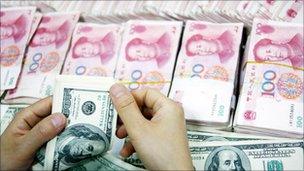US debt crisis turns focus on yuan as reserve currency
- Published

China is trying to internationalise its currency
Washington may have averted a debt default by compromising on how to cut the US budget deficit, but underlying problems remain and those economic woes are driving a global search for an alternative reserve currency.
Officials, from the head of the International Monetary Fund (IMF) to the Philippines finance minister, have warned that the US dollar may lose its reserve status.
For China, the largest lender to the US and the world's second biggest economy, the answer is close to home.
"I think the US debt crisis adds new urgency to the Chinese government's efforts to promote the yuan as an international currency," Zhang Ming, a Beijing-based scholar at the Chinese Academy of Social Science (Cass), tells BBC News.
"Promoting the international use of the yuan will become a way to reduce the country's reliance on the value of US Treasuries."
China holds more than $3.2trillion (20.6tn yuan; £2tn) in foreign exchange reserves, of which 70% is estimated to be in US dollars.
As the dollar falls in value against the Chinese yuan and other currencies around the world, because of the US's financial problems, Beijing faces losses on its holdings.
And that threat may worsen if any of the world's three main credit rating agencies decide to downgrade their triple-A rating for US sovereign debt.
Greenback or redback?
Mr Zhang, who is deputy director of the Research Center for International Finance at Cass, says the global financial crisis of 2008 was the main external reason behind Beijing's efforts to promote the yuan beyond its borders.
"Before the outbreak of the sub-prime crisis, the US dollar was considered a stable international reserve currency," he says.
In July 2009, less than a year after the collapse of investment bank Lehman Brothers, Beijing announced a pilot programme allowing some companies to settle imports and exports with yuan.
That programme was expanded a year later, and continues to grow rapidly, though it is still only a tiny portion of China's overall trade.
According to UBS Securities, trade settlement in the Chinese currency rose from just 18.4bn yuan ($2.86bn; £1.95bn) in the first three months of 2010 to 360bn yuan in the first three months of 2011.
China has signed so-called currency swap deals with Singapore, South Korea, Malaysia, Indonesia and Argentina, among others.
That means companies outside the mainland can borrow large amounts of yuan for doing business.
In August 2010, McDonald's became the first foreign company outside the banking sector to issue yuan-denominated bonds, popularly known as dim sum bonds, in Hong Kong.
A massive, actively-traded debt market is a pre-requisite for any currency to become a reserve currency.
Relocations
In its efforts to promote the yuan, Beijing has chosen Hong Kong to be the principal launch pad.
According to the Royal Bank of Scotland, more than $70bn in yuan deposits are being held in the former British colony, and those assets are growing quickly.
Financial services veterans like William Nobrega from the US are taking notice.
He has just relocated his emerging markets consultancy, the Conrad Group, from Miami to Hong Kong in order to develop yuan-denominated bonds.
"We see the RMB (yuan) as an alternative to the US dollar," he says.
"If the US suddenly developed the courage to have a massive reduction in our debt and massive investment in infrastructure and education, we would remain the world's pre-eminent reserve currency, but, that's probably not going to happen."
Mr Nobrega's clients include fund manager Craig Turnbull, chief executive of Agincourt Capital, who moved from London to Hong Kong in June in order to sell dim sum bonds.
His fund aims to raise $500m Australian dollars (US$542m; £333m) by the end of September, followed by another A$500m next year, for investment in Australian property.
Mr Turnbull's investors would pay in yuan, which he believes will one day become a viable reserve currency.
"What is a reserve currency? Confidence is what it's all about. It is, essentially, belief in the currency and the economy behind it," he says.
Long march
For that, China will have to do more than simply maintain double-digit economic growth.
"The bottom line is that it is still too early for the RMB to become a major reserve currency," says Wang Tao, an economist at UBS Securities.
She says that in addition to being widely accepted for trade, the yuan must also be widely used for finance and investment, which would imply the need for a much larger debt market.
That, in turn, means Beijing would have to allow lending and borrowing rates to more fully reflect market realities, rather than be so tightly controlled by the state.
Of course, the yuan would also have to be fully convertible for both trade and investment, and it must be allowed to float freely against other currencies.
And much more difficult than economic reforms, Beijing may have to consider making profound changes to its political system.
Global investors will demand transparent decision-making and government institutions, something China is far from achieving.
It is difficult to say exactly how long the entire process will take, but it could be a long march.